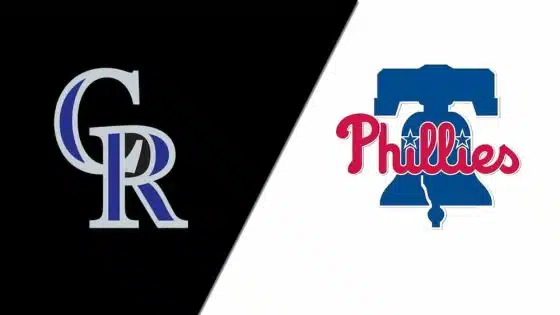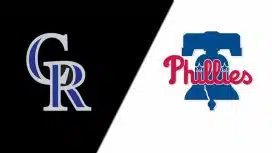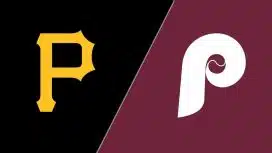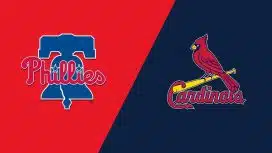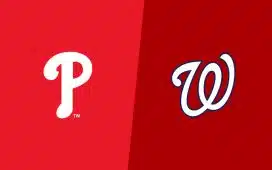Two unique songs are played in Citizens Bank Park after a Phillies victory – Harry Kalas singing "High Hopes" and Bobby Burnett's "Goin' Back to Philadelphia, Pa.". If you're like me, you really enjoy singing these as you make your way to the exit as you leave the ballpark knowing the Fightin' Phils are one game closer to that evergreen dream of a world championship. These tunes remind us of the 1993 Macho Row Mullets and the club's period of decadence from 2007-2011. But they aren't the first songs to remind us of the Phillies and days and nights at the ballpark. For that we need to dust away the sands of time all the way back to 1895 when Howard S. Bott published "The Game the Phillies Play".
Who was this guy and why was he writing music about the Phillies in 1895? Bott was a Philadelphia native born in 1860 and married Emma Douglass, of Beverly, N.J., in the summer of 1885. They had two children, Cordelia (1890-1890) and Howard Jr. (1891-1951). His professions aren't completely known aside from the fact that he was employed by the Vaughn Grammar School while one of his obituaries stated he was a store owner in Philadelphia. Bott enjoyed music and was for a time the president of the Beverly Musical Association. He also wrote short poems that appeared in local newspapers throughout his life. His most lasting association was with the "Omega", a fraternal last man's club of schoolmates formed in 1884 "for the purpose of perpetuating the memories and friendships of youth…". According to his obituary in the Camden "Morning Post", the Omega Club was the oldest last man's club in the country, which helps explain why his obituary was published in newspapers across the country. The club met annually for a banquet until there was one surviving member, at which time the survivor inherited the "historical parchment on which the club's covenant is written". Bott was the one of the last five members. Interestingly, several newspapers who published his obituary provided excerpts from his diary where he recorded details of his imminent death over the course of three days, ranging from feeling ill to losing the use of his limbs and eventual blindness. This man was married, liked music, met yearly with old schoolmates and strangely journaled the loss of his faculties before he died but what does any of that have to do with this piece of music he wrote?
The answer requires us to actually read the verses:
I took my girl to the base ball ground upon a summer's dayFor she was anxious just to see the game the Phillies playWe took our seats upon the stand and heard the umpire squallWith voice that all could understand come now my boys play ball[Chorus]Play ball play ball the umpire cried play ball and don't get gayFor thousands here are wond'ring atThe game the Phillies playNow Sullivan is at the bat the ball is flying high.Poor Sully makes and holds the first.But the pitcher holds the flyThen Thompson swings the stick aroundThey're just the balls he likesBut drops it when the umpire yellsYour out old man on strikes[Chorus]Now Boyle was boiling o'er with rageAnd Cross as cross could be,McGill was pitching into Del,No Homer could they see.When Turner tried to turn aroundTo make a brilliant stop,He smiled at Reilly getting riled,And let the base ball drop.[Chorus]The game is done, we've had our funBut not our moneys worth,We fail to see the Phillies areThe greatest team on earth.The day was hot, the game was not,It couldn't be more tame,And as we leave the festive sceneWe hear a voice exclaim:[Chorus]
The verses seem awfully specific. Is it possible Bott wrote the song about a particular Phillies game? Let's make the assumption that the song is about a specific game and then look into why it might not. So what game?
The Library of Congress copyright date is listed as July 8, 1895, so we have a rough idea as to when that game may have taken place. The first clue is the players Bott included: [Joe] Sullivan, [Sam] Thompson, [Jack] Boyle, [Lave] Cross, [Willie] McGill, [Ed] Delahanty, [Tuck] Turner and [Charlie] Reilly. One key is Joe Sullivan, a shortstop whom the Phillies acquired in 1894. The second key is Willie McGill, who played for Chicago in 1894 and for the Phillies in 1895. McGill is "pitching into" Delahanty, which confirms he is the opposing pitcher. McGill was an unremarkable pitcher who pitched 27 games for Chicago in 1894, one of which was against the Phillies in Philadelphia when he started the first game of a doubleheader for Chicago on May 30 – Decoration Day. What would their day at the ballpark have looked like? Let's dive a little further into the song.
A view from Broad Street of Philadelphia Ball Park
The first verse of the song suggests that Bott and his wife were actually at the game. "I took my girl to the base ball ground upon a summer's day". Why? "For she was anxious just to see the game the Phillies play". She was anxious to see the Phillies. Women in the 19th century engaged with baseball as both players and spectators, so her interest in baseball isn't out of the ordinary whatsoever. The Bott's likely boarded a train with connection to Philadelphia before travelling to Philadelphia Ball Park via the Reading Railroad or Pennsylvania Railroad. Both had stations nearby. They could have entered either of the main gates at 15th and Lehigh or at Broad and Huntingdon, both of which can be seen above in the sketch that appeared in the August 7, 1894 Philadelphia Inquirer. In total, there were seven gates but only four were used regularly as entrances. Bott didn't describe whether their seats were in the pavilion or if they were general admission. They took their seats and the umpired bellowed "PLAY BALL!".
Game announcement from the May 30, 1894 Philadelphia Inquirer
Philadelphia manager Arthur Irwin decided to have his team bat first. From 1887-1949, the home club's manager had the option to have his team bat first. It made more sense to do that in the deadball era because the ball got softer as the game drew on and only one ball was typically used for an entire game.
Back to the Bott's at the ballpark. Billy Hamilton led off the game with a triple and scored on Jack Boyle's sacrifice fly. Then Chicago plated seven runs in the first two innings. The Philadelphia Times noted "It was perfect misery to the crowd to see the ease with which the visiting delegation piled up runs in the second inning". Meanwhile the Phillies offense floundered, recording only one hit from the third through the sixth innings. To make matters worse for the Bott's and the Phillie faithful, star outfielder Ed Delahanty was injured in the fifth inning in a collision with shortstop Bob Allen. The Phillies narrowed the lead in the seventh inning when they scored three runs. Chicago put the game out of reach in the eighth when they scored five runs. The Colts defeated the Phillies 12-4.
Such a loss had the same effect on the home fans 127 years ago as it does now. Bott expressed this disappointment in the final verse when he lamented "we've had our fun, but not our moneys worth" and "the day was hot, the game was not. It couldn't be more tame". He also says the Phillies aren't the greatest team on earth. Decoration Day games were premier events. They were among the most well attended games of the entire year and helped club's go into the black. The Phillies had pennant aspirations in 1894 and one or two wins on Decoration Day would have vaulted them to the front of the National League standings and put them in the driver's seat as summer opened. But it wasn't to be as the lowly Chicago Colts swept the day. Despite having the highest team batting average in major league history, the Phillies finished a distant fourth in the standings. The Phillies were certainly not the greatest team in the world.
There are two inconsistencies with the Phillies-Colts 1894 Decoration Day game and Howard Bott's "The Game The Phillies Play" tune. First, the Phillies didn't acquire Joe Sullivan until July. Second, he identifies Sam Thompson but Thompson didn't appear in the game. It's possible Bott used some artistic license to help make the song more familiar to consumers in 1895. What's interesting is he identifies all four of the Phillies outfielders who had .400 batting averages in 1894. He also includes Charlie Reilly in the song. Unlike many of the others, Reilly wasn't a household name and he appeared in the fewest games among players who played more than a single game for the Phillies in 1894. Reilly did replace Delahanty after he got hurt in the first game against the Colts on Decoration Day. Lastly, why write a song about a loss? It's plausible that this game was the Bott's only visit to Philadelphia Ball Park to see a game and therefore the only inspiration for Bott to draw upon for his song.
So, is "The Game The Phillies Play" specifically about Howard and Emma Bott's experience at Philadelphia Ball Park on Decoration Day 1894? There's a strong possibility, maybe even a likelihood, but it's impossible to say the song is definitely about their ballpark experience that day.

